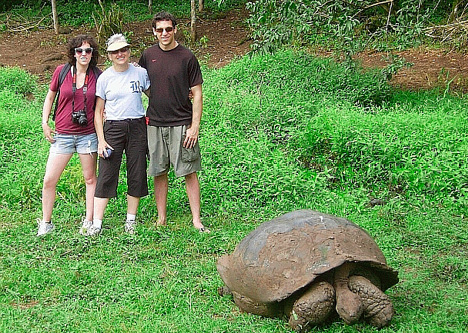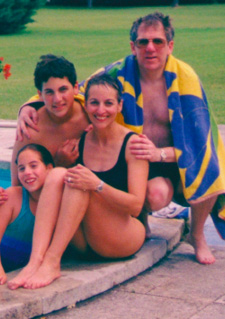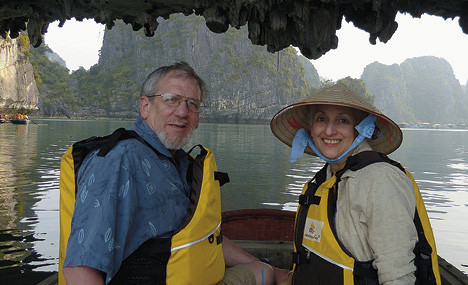Douglas J. Colton – 50th Reunion Essay
Douglas J. Colton
4209 Linnean Avenue NW
Washington, DC 20008-3808
(after 2/5/19) 531 Camino Tierra Alta
Santa Fe, NM 87501
douglas.colton@gmail.com
202-244-0607; 202-680-0233 (C)
Spouse(s): Roberta (1972)
Child(ren): Evan Daniel (1983); Julia Michele (1988)
Education: University of Texas, J.D. (1972)
Career: Private law practice, Los Angeles and D.C.- various firms (1972-2005); Exec. Off. President/OMB, “White House Reorganization” manager (1977); U.S. DoJ Antitrust Div. Spec. Ass’t to AAG/ATD (1977-79); U.S. Postal Service, Off. of G.C. (2005-09); Co-Founder, Chair, G.C., & CFO, Seven Bridges Genomics, Cambridge, MA (2009-14)
Avocations: Meeting people, travel, books
College: Berkeley
I left Yale endowed with a great education. Directed Studies and a random walk through the humanities produced a high-gloss veneer of knowledge, but no glint of purpose or direction. I was going to hitchhike to the left coast, perhaps diverting to Minneapolis to seek poet John Berryman, but made no life preparations beyond that. I floated, aimlessly, buoyed by a 1Y draft status and unreflective faith in the thin reed of Yale’s promise: “Yale graduates 1,000 leaders every year.” I was a Yalie, ergo I would be a leader, a success. At something.
I reached Minneapolis, found Berryman: in two hours, over cookies and milk, he shredded my pretense of being well grounded in modern literature. Suddenly, my flotation reed felt waterlogged. My resources shrank, California receded. Why not just stay there, in prosperous mid-America? The employment agency said my Yale English degree qualified me to look for a job—in PR, or as a “management trainee” —provided I dignified myself with an interview suit. Call home for money? I cycled repeatedly between foreswearing further parental dependence and fearing personal responsibility.
A bolt of insight halted the spin cycle. There was something I knew I could do well: go to school. I thus succumbed to the ’69 default option: law school. I was a Texan, a Yale graduate, and a step ahead of the legal deluge. My application (from a phone booth at the Minneapolis YMCA) to UT Law—a month before classes started—was accepted.
I discovered the study, and then the practice, of law well suited my argumentative, value-light, verbally oriented turn of mind. I was drawn to antitrust, because of its assembly from slippery, manipulable abstractions and minimal engagement with individual tragedy or distress: it was a word game that paid well.
I met Roberta in Houston and we married in 1972. We lived in L.A. while she went to UCLA law, and in 1975 we moved to D.C. to pursue our stereotypical boomer careers. Roberta started a Senate job, and I moved to a name-brand firm with nothing else in mind. Much to my amazement, a series of wholly serendipitous events took me first to the Carter White House (managing its purported “Reorganization”), then to a much happier gig as special assistant to the head of the antitrust division.
Looking back, we were on the leading edge of a flood tide of law firm prosperity, in which even modest success was success indeed. I practiced in the then-emergent field of health care competition, mostly for NfP hospital systems. We built the house we wanted, on the park north of the National Zoo, where we’ve lived since 1985 and raised our kids.
A few decades later, we felt trapped on an up escalator in a culture with no word for “enough.” I erratically exited practicing law, but in 2009 wandered into cofounding a start-up together with two Harvard grads the ages of our own kids. The plan was to build the first and best online platform for computational genomics. And we did: for five years, I was chair, G.C., and resident adult at a from-scratch Cambridge high-tech enterprise, with all the frenzy, melodrama, and exhilaration the cliché demands, including my ouster when a new investor appeared to save us from the brink. I loved (almost) every minute.
Mine has been an unremarkable, but extremely fortunate, life. Much more so than can be fairly attributed to my talents, determination, or effort. Luck, especially in generational timing, better accounts for most of it. Yale’s role? I long ago realized that Yale did not create leaders, or teach us how to be what we became. There was no promise, but Yale was incredibly skilled at identifying applicants who would, by pluck or luck, excel at something. Yale smoothed our rough edges, but mostly insisted that we believe in ourselves. For me, Yale was the purveyor of a self-fulfilling prophecy.

Doug Colton guiding Julia, Roberta, and Evan in the Galapagos

Doug Colton with Roberta & kids Provence 1998

Doug and Roberta Colton, Hoi An, Vietnam (2014)
If the above is blank, no 50th reunion essay was submitted.
